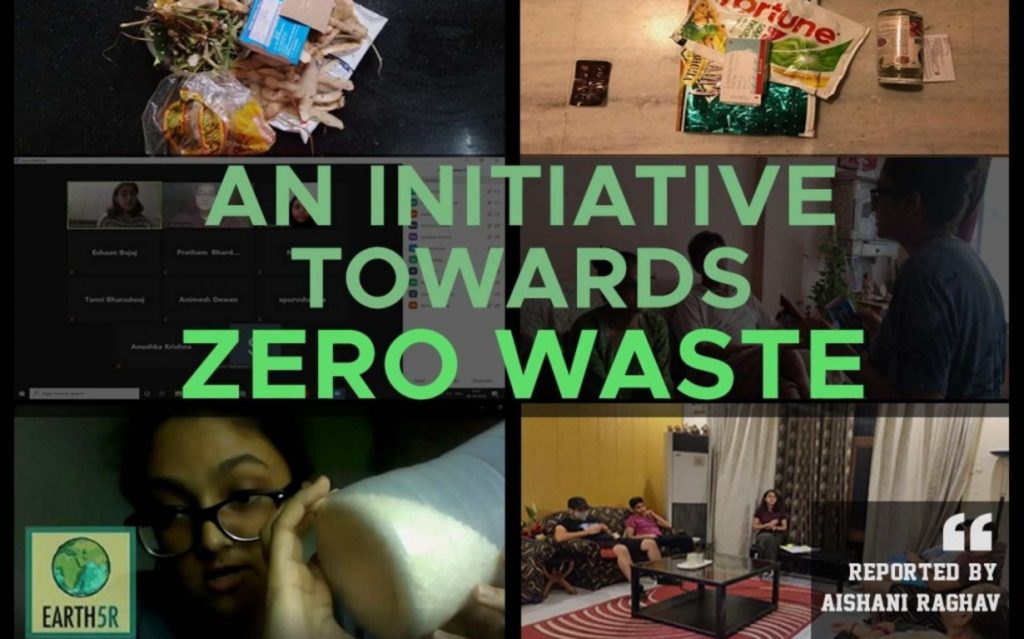
Waste Segregation: The First Step Towards A Zero-Waste Lifestyle
It is our collective and individual responsibility to preserve and tend to the environment in which we all live. ~ Dalai Lama
The Earth5R team has been leading a global environmental movement and working towards environmental justice by building new sustainable methods of restoration for more than five years.
The net learnings from Earth5R’s previous programs – from the grass-roots level to working with intergovernmental organizations and global governments – have helped us evolve and build up our new project where citizens lead the change through individual actions. This exciting project is called “Home Equals Planet”.
Under this project, the Earth5R team came up with 15 tangible actions that are being taken up by the citizens to change the world. Citizens are taking these actions at their home, at a personal level and are treating their surroundings as a piece of the ecosystem.
These actions will be a step towards a healthier lifestyle and a healthier planet.
Initiatives taken by citizens help governments save massive amounts of money which are being spent on climate change mitigation strategies.
As said by the founder of Earth5R, Saurabh Gupta, “The destruction of the planet starts at home.” The oceans have not always been polluted at a large level. It all starts from a small point, a family, a home. The lack of mindfulness is what leads to destruction. If every citizen creates a sustainable home, it can and it will lead us towards a sustainable planet.
This can be achieved through collective efforts of committed individuals. The planet cannot be restored by the efforts of a few people, rather it requires togetherness, a massive decentralised movement led by organizations, partnerships, leaders and citizens.
In order to do so, Earth5R has started training citizen volunteers who further train other citizen volunteers, leading to a domino effect of creating environmental leaders. Our goal is to scale up the impact to an extent where we create the largest network of citizens who are collaborating and are together marching towards a sustainable future.
Under Earth5R’s Home Equals Planet project, citizens are leading the change towards a sustainable world through the 15 actions towards sustainability. Our Waste Segregation and Management action is an initiative towards leading a zero waste lifestyle.
The citizens are trained on how to segregate their waste into different types, that is, wet waste, dry waste, hazardous waste and biomedical waste. They are explained the ways of managing and reducing their waste and the citizen volunteers keep a track of the waste produced in their home on a daily basis on a dashboard on Google Sheets.
This data collected from the citizens is then compiled and converted into graphs and pie-charts. Those graphs are the measurement of the reduced waste and consistent progress made and helps the team analyse and take improvised measures for further growth of the program.
We believe that if something cannot be measured, it cannot be managed and hence cannot be improved.
Today, we have two of our citizen volunteers sharing their story and experience of being a part of the Waste Segregation action.
Riya Dani, from Mumbai, is a Plant Science major who is taking practical steps towards a better environment.
Aastha Dewan, from Chandigarh, is a history honours student who feels deeply about bringing change at individual level and that creating a chain reaction of individual efforts can be revolutionary.
Riya Dani : “Although I have been recycling some of my dry waste for a long time, the Earth5R Home Equals Planet training encouraged me to take up waste segregation more actively and responsibly.
I got to know the importance of responsible disposal, understanding where the waste is going and ensuring that it is going where it is supposed to. It brought some major changes in my life.
The biggest change is feeling proud about myself and my family. I know now, that the little efforts made today will lead to a bigger impact in the future. Even though we start small, at an individual level, we are moving ahead and becoming a part of a change.
Also, I started noticing the packaging of various products and checking if they are recyclable and to what extent. I learnt how recycling differs from region to region. A product could be recycled in one country and would probably be a challenge in another country. All of this changed my perspective about environmentalism.
As we are keeping track of the waste we produce on a daily-basis, I have noticed a significant reduction in the waste I produce everyday. This program has made me very conscious and aware about waste management.
When I conducted training sessions regarding the same, I realised that people are willing but have a misconception that as individuals we are helpless in the face of such global environmental problems. But when I was able to explain to others with conviction and proof that every individual initiative matters, I noticed that there is willingness, as people do get on board once they are given proper explanations and examples.”
Aastha Dewan: “ After the training, when I started with the Waste segregation, I also started keeping track of the waste I produce and the various packaging I use.
I prefer going to a local shop now, rather than online shopping as it is easier to look for better packaging alternatives and having a ton more options available, rather than blindly ordering a product online.
Various myths have been busted after gaining knowledge about waste management and how greenwashing is a major issue. For example, tetra packs are generally marketed as 100% recyclable packaging. Although, due to the multi-layered packaging, it isn’t practically possible to recycle them. I realized that there are a lot of things that ultimately end up in a landfill. This made me conscious about the waste I produce. A recent incident was when I refused to take a plastic bag from a shopkeeper which was a routine earlier and asked him to reuse the bag rather than wasting so many.
This experience taught me something very important, that if something can be recycled, does not necessarily mean it is being recycled.
Aastha while conducting physical training for her family on Waste Segregation
The Home Equals Planet program made me disciplined and aware of the waste me and family produce and I could notice changes within a week of practising waste segregation.
Even during the training session I conducted, I noticed the ignorance of a lot of my friends. There was a general notion that segregation is important. But, after the training, they realized the need for waste management and understood the entire process.”
Aastha conducting her online community training session on Waste Segregation and Management
As it can be noticed from Riya and Aastha’s experiences, the organised, consistent efforts instilled the consciousness and discipline in them that is required to achieve self-sustainability. A systematic action can lead to changes within a short span of time. These individual actions are then connected to the larger picture and boost the entire movement.
The Earth5R team would like to appeal to all the citizens to come forward and join the movement. Participate in the movement and encourage others to elongate this chain of citizen actions. Reach out to Earth5R to know more about the Home Equals Planet program. Visit our website at https://earth5r.org/
The collective consciousness of mankind defines the existence and sustainability of this civilization. ~ Toba Beta.
ABOUT EARTH5R
Earth5R is an environmental organization from India with its head office at Mumbai. It works with the NGO sector, Companies and helps them conduct environmental corporate social responsibility (CSR) programs across India.
Earth5R specializes in circular economy based projects. Earth5R also offers short term and long term environmental courses and fellowships.
Earth5R’s Global Sustainability Hub is a cross-sector and cross-country collaboration in pursuit of UN Sustainable Development Goals. It is an excellent opportunity for governments and the private sector to engage with communities, use Sustainability-based models to drive economic changes, and create social and environmental impact.
– Interviewed by Aishani Raghav




